

If the EPA relaxes deadlines for CO2 cuts, will the U.S. still be able to keep its climate promises? Education increases belief in climate change — everywhere except in the U.S. In China, people are more likely to understand the risks of climate change if they live in the city instead of the countryside.

Almost everyone in Japan knows about climate change. In Egypt, Bangladesh, Nigeria, and India, more than 65 percent of people do. In Burundi, Benin, and Liberia, almost nobody has heard of it. Warming waters are destroying your salmon burger. Tour Alternatiba pour le climat : Incident surréaliste à Fessenheim. Scandaleux : la France demande à la police allemande de bloquer le Tour Alternatiba, en représaille à une prise de parole anti-nucléaire devant la centrale de Fessenheim !

Ironie de l’histoire, la ministre de l’écologie venait d’attribuer le label COP21 à cette “initiative ambitieuse et innovante”. Le Tour Alternatiba est arrivé à Fessenheim ce lundi 20 juillet, après être parti le matin de Mulhouse où 600 personnes avaient accueilli son arrivée la veille dans une ambiance de fête populaire et dans le cadre d’un Alternatiba qui a rassemblé plus de 3000 personnes tout au long d’un beau dimanche ensoleillé.
La police allemande entre dans la ferme où les cyclistes prennent le déjeuner. Le grand bétonnage, une bombe climatique. La banquise du Groenland en danger. Au Groenland, situé aux confins de l'hémisphère Nord, la glace fond à vue d'œil.

Cette année, le thermomètre est passé à 25°C au-dessus de 0. Climate change is a real (Canadian) peach. Climate Central has the story: Shoppers walking down the produce aisle in search of peaches for their grandmother’s famed summertime pie may soon check the price tag and find something they’ve never seen before: “Country of Origin Canada.”As climate change warms the planet and growing regions shift further north, more fruits and vegetables – even citrus fruits – could start making the journey to the United States from Canada.
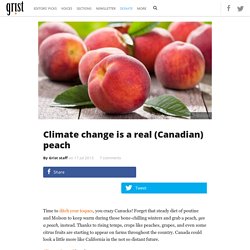
Thirsty birds are dying all over California — thanks, climate change. You know that historic and disastrous drought currently turning California into one big heap of straw?
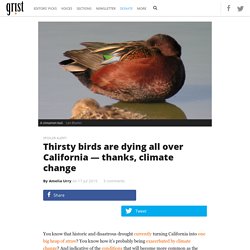
You know how it’s probably being exacerbated by climate change? And indicative of the conditions that will become more common as the climate continues to warm? Coal company demonstrates impressive feats of climate denial. “[T]here are no demonstrated foreseeable effects of any GHG emissions.”
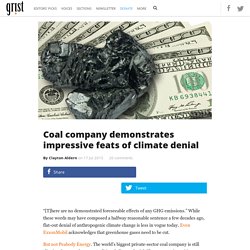
While these words may have composed a halfway reasonable sentence a few decades ago, flat-out denial of anthropogenic climate change is less in vogue today. Even ExxonMobil acknowledges that greenhouse gases need to be cut. But not Peabody Energy. The world’s biggest private-sector coal company is still clinging desperately to unconditional climate denial. The company’s position was demonstrated all too clearly in 71 pages of comments it submitted to the White House Council on Environmental Quality this spring, arguing against considering greenhouse gas emissions as part of analyses conducted under the National Environmental Policy Act.
Obama is paving the way for success in Paris. President Obama deserves major props for laying the groundwork for successful climate change negotiations in Paris this December.

The effort, much of which has happened behind the scenes, doesn’t have the simple sex appeal of rejecting Keystone XL, but it will have a much greater global impact. Over the last year, the Obama administration has wrung groundbreaking climate commitments from China and Brazil, and started making progress with India. The China and Brazil deals exceeded what informed observers had realistically hoped for — they have moved the needle on what’s politically possible and they are building momentum for U.N. talks in Paris. Most importantly, the fact that these countries are working with the U.S. on climate change and pledging to curb their emissions at all means we have crossed the crucial threshold to getting a climate agreement. On June 30, the U.S. and Brazil jointly announced a set of climate and clean-energy goals. Climate change is making wildfires worse and wildfires are making climate change worse.
It’s the season when wildfires rage, and this year they’re raging particularly hard: In June alone, Alaska saw 1.1 million acres go up in flames.
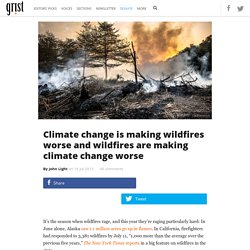
In California, firefighters had responded to 3,381 wildfires by July 11, “1,000 more than the average over the previous five years,” The New York Times reports in a big feature on wildfires in the state. We broke a whole lotta climate records in 2014. As has been seen year after year, the warming of the Earth is causing major changes in many aspects of the planet’s climate, and 2014 was yet another year that showed this trend in stark relief, a report released Thursday says.
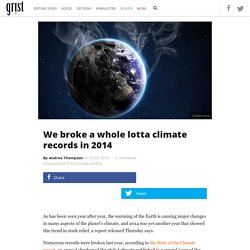
Numerous records were broken last year, according to the State of the Climate report, an annual checkup of the global climate published in a special issue of the journal Bulletin of the American Meteorological Society. Now in its 25th year, the report pulls together hundreds of scientists from dozens of countries to piece together the changes from the previous year in all aspects of the Earth’s climate — from carbon dioxide levels to the planet’s rising temperature, from glacier melt to change in soil moisture — and puts them in the context of decades-long trends. Here are four key points to draw from the report: Four datasets of global temperatures ranked 2014 as the warmest year on record (or tied for warmest) going back to 1880. Here’s more evidence that cutting CO2 pollution can be good for the economy.
The Northeast’s cap-and-trade program generated $1.3 billion in economic benefits for participating states over the last three years.
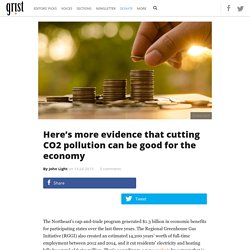
The Regional Greenhouse Gas Initiative (RGGI) also created an estimated 14,200 years’ worth of full-time employment between 2012 and 2014, and it cut residents’ electricity and heating bills by a total of $460 million. That’s according to a new analysis by a group that is creatively named Analysis Group, one of the largest economic consulting firms in the country. In addition to spurring the economy in the participating states — Connecticut, Delaware, Maine, Maryland, Massachusetts, New Hampshire, New York, Rhode Island, and Vermont (Chris Christie pulled New Jersey out) — the system is succeeding at its primary goal: fighting climate change. Stop trying to put climate change in a box. In the story of the blind men and the elephant, the trunky mammal is misidentified as a spear, a tree, a wall, a rope; the men are too siloed from one another to fully discern the animal they’re patting down. Today, the old metaphor from the Indian subcontinent is mostly used in corporate retreats and master’s of public policy programs to demonstrate the gains of synergy (or something thereabouts).
There’s a new elephant lurking in the room, though, and its name is climate change. A new report on the global risks of a changing climate, commissioned by the U.K. How development banks can help restore faith in a Paris climate deal. To truly tackle climate change, we’ll need to mobilize Scrooge McDuck-level rivers of cash — and most of it will need to flow to developing countries.
But most wealthy countries have committed only paltry sums to this end so far, despite signing a 2010 pledge to raise $100 billion annually by 2020. Inscrire la lutte contre le dérèglement climatique dans la Constitution. Ce 14 juillet 2015 est particulier, puisque la France accueille dans quelques mois la COP 21, le sommet international sur le climat, et qu’à cette occasion les yeux du monde seront braqués sur notre pays. La France doit ouvrir la voie. Aussi, monsieur le président de la République, nous vous demandons d’inscrire dans la Constitution le respect des objectifs fixés par la communauté scientifique internationale. La lutte contre le dérèglement climatique est un objectif vital pour nos sociétés. C’est un combat qui va engager le destin de notre siècle et la France doit y prendre sa part. Elle pourrait être cette année l’un des premiers pays au monde, et le seul de son rang, à inscrire le respect des objectifs climat dans sa Constitution. La baisse des émissions de CO2, ce n'est pas exactement pour tout de suite.
Une pause seulement, mais c'est déjà ça. Alors que les émissions de gaz à effet de serre sont en augmentation de 2 à 3% par an depuis le début du siècle, les dernières données montrent que ces émissions auraient stagné en 2013 et 2014. Une première, et un répit encourageant alors que s’ouvrira dans quelques mois la Conférence de Paris (COP21), consacrée aux changements climatiques. Des raisons d’y croire donc. D’autant que cette stagnation ne s’est pas faite aux dépens du développement économique, comme l’estime le climatologue Jean Jouzel, au micro de France Inter : "C'est pour moitié grâce à l'efficacité énergétique, pour moitié grâce aux énergies renouvelables.
Fossil fuels are terrible investments, says top energy economist. A lot of things are better when tapped at the source. Spring water. Maple syrup. Apple advice from the Genius Bar. So when the chief economist at the International Energy Agency warns that you might be making a bad energy investment, it’s worth listening up. Speaking in Paris today at the largest climate conference before December’s flagship U.N. climate negotiations, Fatih Birol, also the agency’s incoming executive director, dealt some strong words to energy companies and groups invested in fossil fuels. Fossil fuel companies have been lying about climate change for more than 30 years.
For nearly three and a half decades — longer than many of you dear Grist readers have even been alive — the fossil fuel industry has waged a campaign to obfuscate and mislead the public on the science surrounding climate change. It’s all laid out in a new report by the Union of Concerned Scientists. The report pulls together a number of industry documents, some disclosed only this year, that show that even though the industry knew that burning fossil fuels put the planet’s climate and residents in danger — one 1995 industry report noted that “the science of the Greenhouse Effect is well established and can be demonstrated in the laboratory” — the companies campaigned to keep policymakers and the general public from arriving at the same conclusion “In the 1980s, Exxon needed to understand the potential for concerns about climate change to lead to regulation that would affect Natuna and other potential projects.
The worst drought in a decade continues in Thailand: Bangkok in danger of severe water shortage. Severe drought conditions in the capital of Thailand, Bangkok have drained water supplies since June 2015, and the city is now in danger of running out of drinking water in the next 30 days. The reservoirs of tap water are running low, severely affecting the country's agriculture. With about 5.2 million cubic meters of drinking water produced per day, Bangkok metropolitan area holds over 14 million people. Le territoire des bourdons se rétrécit sous l’effet du réchauffement climatique. State of emergency issued for 14 regions in Peru as El Niño conditions strengthen.
As the 2015 El Niño climate phenomenon continues to strengthen, a 60-day state of emergency was issued for 14 regions in Peru, to beware of possible damage that could result from the event, confirmed Juan Benites, the Minister of Agriculture and Irrigation. The El Niño conditions cause a rise in sea surface temperature, which consequently causes heavy rains, flooding in coastal and river areas and droughts in other regions. The emergency declaration warned the authorities to prepare for the "imminent danger" of El Nino and unusual climate conditions, according to the state news agency Andina.
Nevadas mataron a más de dos mil alpacas en Puno. Aunque aún se están consolidando los datos de las pérdidas producidas por el temporal de nevadas del último fin de semana, a nivel regional el subgerente de Defensa Civil y responsable del Centro de Operaciones de Emergencia Regional (COER), German Quispe Chaiña, dio algunos alcances preliminares. El funcionario indicó que en ocho provincias se produjeron las nevadas siendo las más afectadas cuatro de ellas como San Antonio de Putina, Carabaya y Sandia. Climate change leaves trees out to dry. Once Hailed As Solution to Climate Change, Carbon Capture and Storage 'Is Not Happening' Carbon capture and storage (CCS) is backed by governments and the International Energy Agency (IEA) as one of the best methods of reducing carbon dioxide levels in the atmosphere and saving the planet from overheating.
The problem is that despite this enthusiasm and the fact that CCS (also called carbon sequestration) is technically possible, it is not happening. It is cheaper and easier to build wind and solar farms to produce electricity than it is to collect and store the carbon from coal-powered plants’ emissions. Floods and landslides hit Colombia affecting 202 332 families. After days of heavy rain, severe floods, from overflowing rivers, and landslides hit the northeast of Colombia, once again destroying homes, roads and bridges and cutting of power and water supplies.
Climat, les territoires adoptent la positive attitude. Réduire de 1,5 milliards de tonnes la quantité de gaz à effet de serre émise dans l’atmosphère d’ici 2020 ? Difficile de se représenter à vue de nez ce que cela pèse réellement. Disons, toutefois, que cela équivaudrait peu ou prou à la moitié de ce que l’Europe émettait de CO2 en 2013 (3,5 milliards de tonnes). Watch ADEME's Vine "#InnovClimat #Cop21" Will EPA Heed the Pope's Call to Save Our Oceans?